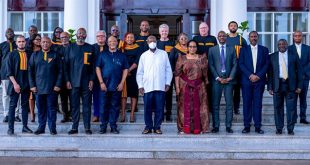
Project finds most manufacturers in Uganda unaware of opportunities in efficient water use
Kampala, Uganda | RONALD MUSOKE | Uganda easily qualifies as one of the most “water secure” countries in Africa. In the south of the country you find Lake Victoria, Africa’s biggest freshwater lake while the world’s longest river, the Nile, runs northwards and drains the length of the country. Uganda boasts more freshwater lakes, rivers, thousands of streams and plenty of underground water.
Yet when you talk to water experts in the corridors of the plush headquarters of the Ministry of Water and Environment in Luzira, Kampala, which is just metres away from Lake Victoria in the south of Kampala, they say describing Uganda as water secure is not entirely accurate.
Florence Adongo, the director of water resources management in the Ministry of water, says Uganda was possibly water secure in the past, but its fresh water is fast declining in terms of quality and quantity.
“We are in the era of climate change and the demand for water is also increasing as the population grows,” she says.
Dr. Callist Tindimugaya, the commissioner water resources planning and regulations department in the water ministry says the country is a hotchpotch of contradictions water-wise; several parts of the country are grappling with too little water while others are battling too much water. Meanwhile other places have water but its quality is poor.
Away from homes and farms, water is increasingly demanded by a fast growing manufacturing sector. A recent study in the water ministry found close to 3000 micro, small and medium scale enterprises across the country which directly use 16% of water in their production processes.
But these same industries have no clear plans of managing their wastewater, a practice which is partly responsible for the deteriorating water quality in the country’s lakes and rivers.
The European Union has stepped-in to help the Ministry of Water to support more efficient water use in the manufacturing sector. In a two year pilot project, they have been offering prizes to manufacturers who achieve outstanding performance in efficient water use and reduced pollution at source.
The ministry headquarters was on July 19 the venue for the award ceremony and Adongo explained the rationale for the project.
“We realised that the major water users in the country at the moment are manufacturers but we also found out that they rank highly when it comes to pollution of the water resources,” she said. She explained that many manufacturers were not aware of costs associated with water use within their enterprises and the impact of their water use activities on the community and environment. And she dwelt quite a bit on wastewater.
That is why the Ministry of Water and Environment in partnership with the Uganda Cleaner Production Centre (UCPC) implemented the Switch Africa Green project. Using up to US$200,000, the project which ran from 2016 to 2018 focused on the “demand side management of water use efficiency in micro, small and medium sized enterprises through promotion of water use efficiency techniques and practices.” Its goal was to introduce proactive eco-modern approaches to water during consumption through cleaner production.
It introduced a ‘Blue Certificate Award Scheme’ under the theme of “Industrial Water Use Efficiency as a Catalyst for Compliance and Competitiveness.”
Silver Ssebagala, the executive director of the Uganda Cleaner Production Centre told The Independent that the project was intended to help enterprises reduce their water consumption levels.
“When you apply the concept of cleaner production to water, it means that you will be using less water per unit output,” he said, “This means that we are aiming at achieving more using less water and it further implies that the company’s cost for water reduces and the company saves upon the production cost because it is paying for less water.”
On the other hand, he said, when a company uses excess water, a lot of it is not useful; it is waste water which is discharged out of the factory as wastewater which often pollutes water sources. When water sources are polluted, the amount of available fresh clean water for use, either for agriculture or drinking, is reduced.
Over 20 local companies spread across the country volunteered to take part in the training. They varied from those which use water as their core resource (beverage companies) to tea, sugar, dairy, vegetable oil, food processing and leather tanning factories.
The 24 enterprises that took part in the training and were monitored over two years were evaluated on several criteria, including water productivity. Enterprises which, for instance, had the highest amount of water saved in cubic metres were graded the best.
Companies were also scored on compliance with national regulations, international benchmarks, investment in water efficiency mechanisms, the number of implemented interventions (technology, water recycling, rainwater harvesting, and waste water recovery) and a reduction in pollution.
Based on these parameters, Lakeside Dairy Ltd took the top prize followed by the Lugazi-based Sugar Corporation Uganda Ltd while the Mbarara branch of Century Bottling Company came third. Kazire Health Products and Buhweju Tea Factory came fourth and fifth respectively.
Sarah Birungi, a senior manager at the Mbarara-based Lakeside Dairy Ltd told The Independent that taking first position was well deserved given their recent outlay of investments at the company. Birungi said the company had invested up to US$ 300,000 to minimize leakages in the process of milk processing and water usage.
“Before this project came, we used to lose thousands of litres of milk because of leakages,” she told The Independent, “(But now) the more we resort to new methods, the more we save on expenses.”
 The Independent Uganda: You get the Truth we Pay the Price
The Independent Uganda: You get the Truth we Pay the Price



